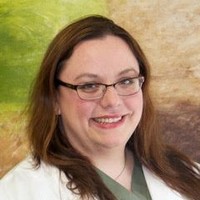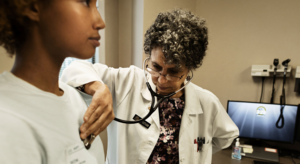 Physicians often ask me, “How long does it take to transition to a nonclinical career?” My answer is always, it depends. From my experience, the time ranges from 3 months to 2 – 3 years, with an average of 12 – 18 months.
Physicians often ask me, “How long does it take to transition to a nonclinical career?” My answer is always, it depends. From my experience, the time ranges from 3 months to 2 – 3 years, with an average of 12 – 18 months.
Today I’m honored to introduce Dr. Jennifer Spector, a podiatrist, and surgeon whose recent transition took about a year and landed her doing something very interesting!
Please read on to “hear” her transition story in her own words.
“Almost exactly one year ago, I hit the proverbial wall. I had been toying with the idea of transitioning to a non-clinical career, but it was my five-to-ten year plan.
Originally, the changes in medicine over the past decade or so, along with increasing deterioration in the doctor-patient relationship and constant pressure to do more with less support made me realize that I had too many years left in my working life to continue to endure it all.
Due to family and professional obligations, I planned on recertifying my boards one more time and fulfilling some leadership plans.
Instead, last year, I sat in my car, snow falling outside, waiting for an emergency add-on surgical case to be fit in. As opposed to being invigorated by the challenge and honored by the opportunity to help this person, my anxiety was through the roof, even though I had performed similar procedures for over a decade. When it came time to scrub in, the anxiety disappeared, as the patient became my primary focus. In hindsight, it was a privilege to be there for that patient and provide limb-saving care. But I realized something in that car that night:
I was ready to move on.
I won’t get into a deep discussion on physician burnout at this time. But my journey over the past year has been life-changing.
As recently as six months ago, I was still in the OR.
Today, I am a full-time editor for a medical publication in my specialty. Over the past five years or so of my clinical career, I had the opportunity to develop skills in writing, editing, leadership, speaking and even meeting planning. Back in that snowfall at the hospital, I didn’t know what my next step would look like, but I believed in my soul that I had the skills to take it.
Being a Type A person, not unlike most physicians, I attacked this project head-on. I quietly began updating my CV (not realizing yet that a CV wasn’t the most appropriate document in this new world), shoring up my LinkedIn contacts and trolling job boards online to see what came up in my searches.
A few months later I pulled the trigger and gave my 90 days notice to my practice owner. It was one of the scariest things I have ever done. I didn’t have another job lined up yet. I hadn’t even been granted one interview. I was terrified.
But at the same time, I believed deep down that this was the right choice. I worked with Heather, who did a fantastic job of helping me sort through the myriad of options to really hone in on where I belonged. With her help, I turned that CV into a resume optimized my network, and gained vital knowledge in the non-clinical job search process. My husband kept telling me that my perfect job was out there, it just wasn’t ready for me yet. Being the more pragmatic of the two of us, I rolled my eyes. But, he was right.
Finally, in the early summer, I started getting bites from companies where my background and skills were uniquely applicable.
My search had narrowed down to medical writing/editing and test optimization/development.
I applied for an editorial position at a company where I knew one of their publications was in my specialty but felt like my skills could fit in multiple areas. I did a silent happy dance when I found out during my initial phone interview that the position in question was indeed within my specialty.
I answered the question over and over again through the process as to “Why did you leave practice?” Initially difficult to answer in a way that felt authentic, I eventually found my stride in an answer I was comfortable with.
I was offered the job and began the next stage of my career two months after leaving clinical practice. I can honestly say that I am living in a completely different world, professionally, but I am learning so much and am so appreciative of this opportunity. My company actually sends surveys out via e-mail every week, anonymously assessing employee engagement and satisfaction, instead of me being assessed by a patient survey!
That was particularly ironic to me. Our feedback is valued, I have the option to work from home once a week, and resources exist for me to seek professional guidance and support in my workplace, while also being given the respect and space to work independently.
My training and experience are valued.
Each day in this new position is different. I might be editing an article from a fellow physician-author or tweaking the layout of a piece ready for publication. I manage our social media presence and post almost daily on our website. I create e-newsletters with content geared towards docs in my field and correspond daily with current and potential authors. I’ve also been fortunate to write a few pieces, including an upcoming feature on physician burnout.
My clinical background is invaluable to this job, but I have to have a thirst to learn every day. It is a very detailed job, but in a completely different way that medicine was. The exact styling of the word postoperative (post-operative?) would not have been on my radar in a SOAP note. But I am very grateful for colleagues and supervisors who are patiently supportive when I ask a “rookie” question and I hope I am the same to them when they have a clinical question.
I don’t wake up in the middle of the night worrying about patients. I don’t live in a constant state of doom and gloom that the other shoe is going to drop. Imposter syndrome is a much less frequent visitor.
My husband commented that I began sleeping better within the first two weeks. I actually feel like I have the mental and physical time and space for some attempt at self-care. I do miss the connection with patients and the feeling of focus in the OR. I sincerely hope I made a difference during my clinical career. But I am completely certain I made the right choice. For the first time in a long time, I’m excited to go to work. I know my personality well enough to understand that the anxiety is going to still surface, and it does.
For those looking to walk a similar path, I recommend you have a few writing samples available for potential employers. For me, it didn’t have to be a peer-reviewed article, per se, although I’m lucky enough to have one of those under my belt. It can be a blog for your practice or a newsletter entry for an organization in which you are a member. Don’t underestimate the skills you have gained through your clinical years. Look at projects you have taken on, or organizations you are passionate about. How can those translate into the non-clinical world?
It deeply saddens me that medicine is losing good practitioners due to burnout, lack of support, or similar issues. I mourn that I felt I needed to “break up” with my lifelong dream. I’m still going to recertify my boards, just under an “admin” status. I’m almost finished with the term on my leadership commitment. It is an honor to still serve my profession and specialty in a meaningful way. Light can and does exist at the end of the tunnel for those of us seeking non-clinical alternatives, I promise.”
A big “Thank you” to Dr. Jennifer Spector for being willing to share her story here!
If you missed my interview with Dr. Xiomara Santos about her transition from OB/Gyn to freelance medical writer, you can read it here.
Latest Posts
Find what you're looking for:
Popular Categories:
Career Change | Career Enhancement | Job Search | Personal Development
2 Comments
Leave a Comment























Amazing Post! Just Visited. I found it very interesting. Thanks, Great work
Thank you Navpreet!